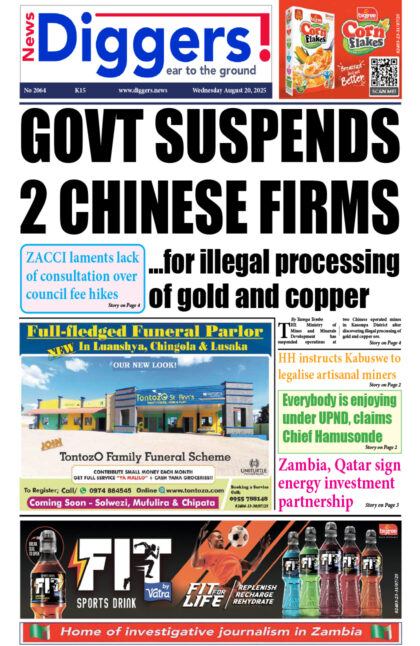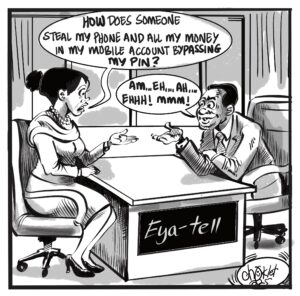Dear Aka Monde,
Am a man aged 33 married with 2 children and currently working for the government as a civil servant. I was recently approached by people from my village that I stand as a member of parliament. My mother is not for the idea as she feels am too young to get involved in politics and she worries that if I lose then I will be another statistic of an unemployed youth on the streets, she is also worried of juju issues from competitors as she claims they have been warning her indirectly that I stay away. My dad on the other hand says I give it a try though he doesn’t say it in front of my mother. My wife shares my mothers view, she fears if I lost, she will be the bread winner as I try to pick myself up either in business or finding another job which will be difficult in government to get back into. Personally, I feel the wind of change and believe this is the time for the youth. I know I do not have the financial muscle but would really want to represent my people. What’s your advise?
A.H.
Dear A.H
In the Zambian political history, you will notice that our forefathers started politics as youths. Dr. Kenneth Kaunda became President at 40 years old. Harry Mwanga Nkumbula, Simon Mwansa Kapwepwe, Sikota Wina, Mainza Chona, Nalumino Mundia, Nakatindi Nganga, Chibesa Kankasa and Julia Chikamoneka as freedom fighters all started politics as young people. Dr. Vernon Mwaanga was Zambia’s youngest post independence ambassador at 21 years.
For political systems to be representative, all parts of society must be included and this includes the youths and elderly. When young people are disengaged from political processes, a significant portion of the population has little or no voice or influence in decisions that affect the nation.
Often times, we complain of the calibre of youths who are in our political space today. Most youths are used in unnecessary fights and threats especially during election periods and for as long as Zambian citizens see politics as a dirty game which they cannot get into, then we should be ready to accept the calibre of people we get of thinking fists, military boots and threats of everyone claiming they know how to throw punches and insult as the order of the day.
To make a difference in the longer term, it is essential that young people are engaged in formal political processes and have a say in formulating todays and tomorrow’s politics. Inclusive political participation is not only a fundamental political and democratic right but also is crucial to building stable and peaceful societies and developing policies that respond to the specific needs of younger generations. For young people to be adequately represented in political institutions, processes, and decision-making, and in particular in elections, they must know their rights and be given the necessary knowledge and capacity to participate in a meaningful way at all levels.
The inclusion of young people in formal political processes is important from the start. Young people’s active contributions can bring democratic values to life and fresh approaches to democracy.
Globally, youth participation and representation in institutional political processes and policy-making is relatively low. People under the age of 35 are rarely found in parliaments, public administration, and decision-making bodies. With a quarter of the global population between the ages of 15 and 35, the world has the largest generation of young people it has ever seen. This presents immense potential for progress, with each young person bringing new ideas and new energy. Zambia itself has its largest population in the youth range.
Despite this, across the world, young people are frequently excluded from political processes and political parties. The youths must have the opportunity to participate at every level of the decision-making process. Young people are the future of their country’s development. They are also the present, and they should have the power to influence the world around them. This is especially important given that some of the world’s toughest challenges affects the youth, including unemployment and environmental degradation from mining and deforestation. We need the input and power of young people to effectively counter these challenges; ensuring that policies include their views and reflect their needs.
Lately, we have seen online campaigns of youths wanting to get involved in movements for change and addressing themselves as Honourable signifying their need to stand as local leaders. They are using online social networks and communities to connect, express their voices, and campaign for change. This for the youths is a good starting point for a better future for current and new generations.
Although young people are involved in activism in the digital space, protesting, volunteering to improve their communities and innovating for social good, their participation in and influence on formal politics is limited. Significant obstacles to youth political participation occurs at different levels and in different areas, including structural, individual, and organizational ones.
There are arguments both countering and supporting the idea that young people lack the maturity, experience and knowledge necessary for making informed decisions. But there has to be a starting point, if the youths are not given an opportunity, then when will they learn?
Money plays an important role in electoral processes. Without money, it is difficult for politicians to reach out to and inform citizens about their manifestos or to motivate people to register and get out to vote. It is difficult to be adopted as a youth in a big political party due to finances as most members want someone who can give them “ka sumthing” which most youths cannot afford. The costs for nomination fees and campaigning are high or escalating which limits participation to wealthier individuals who are not the youth. Money therefore, creates an uneven playing field and electoral process.
High and often escalating costs often limit opportunities for young people with relatively less influence or financial means, regardless of how eager they are to run for office. If the ministry in-charge of youths could put up a deliberate policy that can fund or support youths who want to stand in politics even with just nomination fees which could be in form of loans, it would assist a great deal of youths to have a starting point especially those youths who do not have wealthy backgrounds or established political families.
Getting back to the fears your mother and wife are having; it is a normal human reaction to fear. Fear alerts us to what can go wrong and prepares us to deal with it. Every time you face your fear, you are giving yourself the chance to learn more about yourself, your limits on how to push past them. You must understand that there is an important difference between facing your fears and embracing them. Facing one’s fears is taking action to confront the fear. Embracing fear is seeing an opportunity for growth rather than just an obstacle. What if you win, A.H.?
I want to believe you have thought it through and have a plan of what will be next in case you lose the elections. Money is useful in campaigns but believe you me, when it is someone’s time to lead and win, not the lack of money or anyone’s doing will stand in their way. Some members of parliament have lost to individuals with little money. As for the juju scares, no man lives forever, even the most famous dictators/doctors or traditional healers die at some point so we can’t live our lives in fear, never give anyone power to instil that kind of fear in your life.
The universe seems to have a way of giving to someone what they deserve at a particular time and you will never know unless you try. So, what if you stand and win? What if this wind of “time for the youth” is also blowing in your favour? Wishing you the best of luck should you stand in 2026.
Seek help when in need, visit a counsellor near you!
About the author
Aka Monde, is a licensed Professional Counsellor who holds a Master of Science in Counselling from the University of Zambia. She believes in the adage “a problem shared, is a problem half solved.” Speak to your pastor, church elder, elderly family member or see a professional counsellor when in need.
Email: [email protected]
























